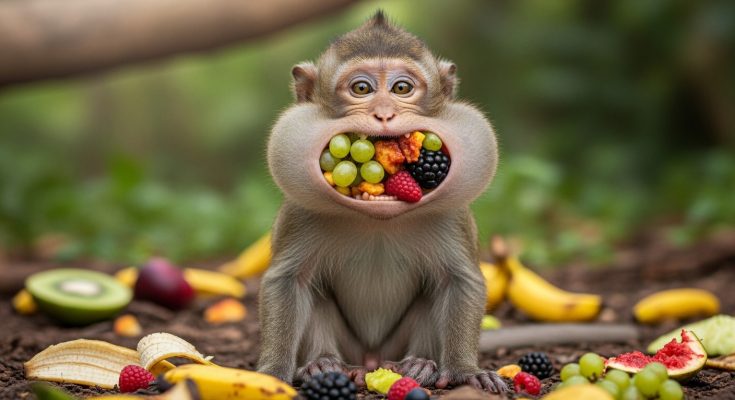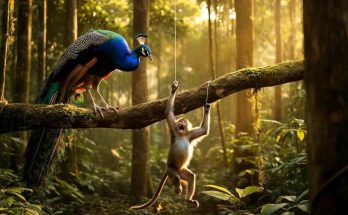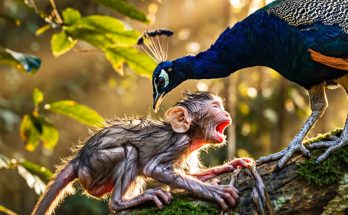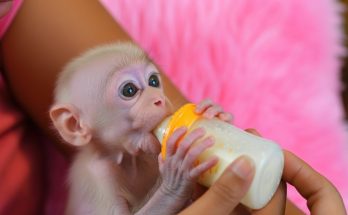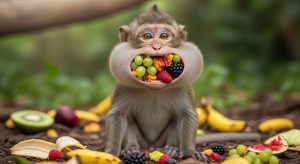
The sun had barely risen over the edge of the forest when the first golden rays slipped between the branches, waking the jungle from its deep, humid sleep. Birds called to each other in sharp, cheerful notes, their songs bouncing off the canopy. The air was heavy with the smell of damp earth and the sweet perfume of ripening fruit. For most animals, this was the hour of fresh beginnings, the time when the jungle promised food, safety, and hope.
But for one little monkey, hope was growing thin.
His name was Kavi. He was small compared to the other monkeys of his troop, with thin arms and ribs that showed beneath his fur. For many days, he had eaten almost nothing. The forest, though rich in beauty, was not always generous with food. Heavy rains had ruined many of the fruit trees, and larger monkeys, stronger and more aggressive, had claimed what was left. Each time Kavi tried to sneak a banana or pluck a mango, he was shoved aside, bitten, or chased into the undergrowth.
By the time dawn broke this morning, Kavi’s stomach hurt so badly from emptiness that it felt like a stone pressing inside him. His mouth was dry, and his body trembled with weakness. Hunger had become his shadow, following him everywhere, whispering in his ear, reminding him of what he lacked. He dreamed of fruit—the soft sweetness of ripe papayas, the sticky taste of jackfruit, the gentle bite of guavas. But dreams could not fill his belly.
That morning, as he wandered alone, Kavi caught a scent so strong that it made his eyes widen. The fragrance was overwhelming—thick, rich, and unmistakably sweet. His tiny nose quivered, and he knew instantly: somewhere nearby, there was fruit.
He scrambled through the low bushes, his claws scraping the ground as if pulled by an invisible force. Then he saw it.
An enormous tree stood at the edge of the clearing, its branches heavy, sagging under the weight of ripe fruit. Bright oranges, red guavas, clusters of bananas, even a few hidden mangoes clung to the branches. It was a sight so glorious that Kavi froze in disbelief. He blinked, afraid that it was just another hunger-born vision. But when a banana dropped from the branch and landed with a soft thud on the ground, the smell hit him again, raw and undeniable.
Kavi let out a little cry—half joy, half desperation—and ran toward the tree.
For the first time in days, food was within reach.
The First Bite
Kavi climbed quickly, though his body trembled with weakness. His claws dug into the bark, and with each movement, the fruit came closer. He reached the first branch and grabbed a banana with both hands, tearing it from the cluster. Without hesitation, he peeled it with frantic fingers and shoved the soft yellow flesh into his mouth.
The taste exploded on his tongue. Sweetness so pure that his body shivered. He chewed quickly, almost choking, but he didn’t stop. He devoured the banana, his cheeks puffing like a squirrel’s, juice dribbling down his chin. He swallowed, gasped for air, and immediately reached for another.
This time it was a guava. Harder, crunchier, with a tang that made his tongue tingle. He bit into it as though the fruit might disappear if he didn’t eat fast enough. He ate and ate, each bite filling the emptiness but also awakening a desperate hunger that had been buried too long.
The more he ate, the less control he seemed to have. His small body, starved for so long, drove him into frenzy. Bananas disappeared in seconds. Papaya flesh smeared his hands orange. Mango juice dripped from his mouth, sticky and sweet, soaking the fur on his chest.
He forgot about danger, forgot about other monkeys, forgot about everything except the taste of fruit and the burning need to fill his hollow belly.
The Greed of Hunger
At first, Kavi thought he would eat only until he was satisfied. But hunger is tricky—it does not vanish the moment food touches the stomach. For Kavi, the emptiness had grown so large that even after ten bananas, three guavas, and a mango, he still felt like something was missing.
His body, driven by instinct, pushed him onward. He leaped from branch to branch, stripping the tree bare. He ate the soft inside of jackfruit, the sticky sweetness coating his paws. He chewed bitter fruit he would normally avoid. He cracked open green pods and swallowed the seeds.
The jungle grew quiet as he feasted. Birds paused their songs to watch the little monkey devour everything he could reach. A squirrel stared in disbelief. Even a parrot, perched nearby, tilted its head as if confused at the sight.
Kavi did not notice. His world had narrowed to one thing: fruit.
Hours passed. The ground beneath the tree was littered with peels, skins, and seeds. Branches that once hung heavy with food now stood bare, stripped clean. Kavi’s stomach bulged, round and tight. His limbs were sticky with juice, and his fur clumped together from the mess. He panted, exhausted, but still reached for one last guava, biting it even though his body begged him to stop.
He had eaten it all. Every fruit the tree had offered.
The Aftermath
For a moment, silence hung heavy in the clearing. Kavi sat on a branch, clutching his swollen belly. He should have felt joy, but instead, unease crept over him.
His stomach hurt—not the sharp ache of hunger, but the painful stretch of overfilling. He groaned, curling slightly as cramps rolled through him. His chest rose and fell in short breaths. His tongue, once desperate for sweetness, now felt sticky and heavy.
Down below, the peels glistened in the sunlight, reminders of his feast. He looked at them and suddenly felt shame. He had eaten everything. Not a single fruit remained for the others.
Kavi thought of his troop—the bigger monkeys, the mothers with babies clinging to their bellies, the young ones who would search for food later. When they came to this tree, they would find nothing. No bananas to peel, no guavas to bite, no mangoes to taste. He had taken it all.
For the first time that day, he felt fear—not fear of hunger, but fear of what he had done.
The Troop Arrives
It was not long before Kavi heard rustling in the distance. His ears twitched, and he froze. Voices rose—the chatter of monkeys moving together, the sound of leaves shaking as they approached.
The troop had arrived.
Kavi’s heart pounded. He looked at the bare branches, the littered ground. His paw tightened around the half-eaten guava he still held.
The first monkey, a large male, swung into the clearing. He paused, sniffed, and then let out a loud, angry screech. More monkeys followed—mothers, young ones, juveniles. Their eyes widened as they saw the empty tree, the discarded peels, and Kavi sitting in the middle, belly swollen, fur sticky with juice.
There was no need for explanation. They knew.
Angry cries filled the air. One monkey bared his teeth, another lunged toward the trunk. A mother clutched her hungry baby close, glaring at Kavi with eyes full of reproach.
Kavi trembled. His body was too heavy to run, his stomach too full to climb quickly. He tried to move, but pain shot through his belly. He felt trapped.
The troop surrounded the tree, their voices harsh, accusing.
Lessons of Hunger
In that moment, Kavi understood. Hunger had made him blind, turning need into greed. He had thought only of himself, of filling the emptiness inside, but in doing so, he had left nothing for the others.
The jungle was not just his home—it was shared by many. Every fruit, every tree, every branch belonged to the troop, not to one small monkey.
Now, because of his desperation, he was alone.
The monkeys did not attack him, but they did not welcome him either. They scolded him with shrill cries, then turned away, searching for food elsewhere. Kavi sat quietly on the branch, clutching his aching stomach, his heart heavier than his belly.
He watched them leave, mothers carrying their babies, juveniles leaping between branches, hungry eyes scanning for what little fruit the forest might still offer. He realized then that food was not only survival—it was trust, it was sharing, it was life together.
Kavi had broken that trust.
A New Dawn
That night, Kavi lay curled in the crook of a tree, his body heavy with too much food. He could not sleep easily; his stomach groaned, and his thoughts churned. He remembered the looks of the others, the cries of the hungry babies, the disappointment of the troop.
When dawn came again, soft and pale, Kavi sat quietly, staring at the rising sun. He felt different. He had survived his hunger, but at a cost.
From that day on, Kavi tried to change. He still sought fruit, still longed for sweetness, but he no longer ate until everything was gone. When he found a tree, he filled his belly just enough, then stepped aside, waiting for others to join. Sometimes he even carried fruit in his hands and placed it near the mothers, watching the babies nibble with tiny teeth.
It was not easy. Hunger still whispered to him, tempting him to take more. But each time, he remembered the empty tree, the angry cries, the shame of sitting alone. And slowly, the troop began to trust him again.
Kavi learned the hardest lesson of all: hunger can make a heart selfish, but true survival is not about taking everything—it is about sharing what little the jungle offers.
And though he would always remember the day he ate all the fruit, he carried that memory like a scar, guiding him toward something greater than fullness: belonging.
